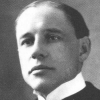A fanatical group all together have a comfortable feeling that they’re all friends with one another. They are all very much excited about the same thing. You can see it in any political party. There’s always a fringe of fanatics in any political party, and they feel very cozy with one another; and when that is spread about and is combined with a propensity to hate some other group, you get fanaticism well developed.
Bertrand Russell (1872-1970) English mathematician and philosopher
Interview by Woodrow Wyatt, BBC TV (1959)
(Source)
Collected in Bertrand Russell's BBC Interviews (1959) [UK] and Bertrand Russell Speaks His Mind (1960) [US]. Reprinted (abridged) in The Humanist (1982-11/12), and in Russell Society News, #37 (1983-02).
Quotations about:
tribe
Note not all quotations have been tagged, so Search may find additional quotes on this topic.
Remember, that the wit, humor, and jokes of most mixed companies are local. They thrive in that particular soil, but will not often bear transplanting. Every company is differently circumstanced, has its particular cant, and jargon; which may give occasion to wit and mirth, within that circle, but would seem flat and insipid in any other, and therefore will not bear repeating.
Lord Chesterfield (1694-1773) English statesman, wit [Philip Dormer Stanhope]
Letter to his son, #167 (29 Oct 1748)
(Source)
If I know your sect, I anticipate your argument.
Ralph Waldo Emerson (1803-1882) American essayist, lecturer, poet
“Self-Reliance,” Essays: First Series (1841)
(Source)
Politics, as a practice, whatever its professions, had always been the systematic organization of hatreds.
Henry Adams (1838-1918) American journalist, historian, academic, novelist
The Education of Henry Adams, ch. 1 (1907)
Restated by George Will in saying that the value of political parties was that "They organize our animosities." Interview, The Colbert Report (3 Jun 2008) at 6:43.
The history of the Jews also shows that oppression and persecution are far more efficacious in binding a nation together than community of interest and national prosperity. Increase of wealth divides rather than unites a people; but suffering shared in common binds it together with hoops of steel.
You ask me in effect why I am not a Roman Catholic. If it comes to that, why am I not — and why are you not — a Presbyterian, a Quaker, a Mohammedan, a Hindu, or a Confucianist? After how prolonged and sympathetic study and on what grounds have we rejected these religions? I think those who press a man to desert the religion in which he has been bred and in which he believes he has found the means of Grace ought to produce positive reasons for the change — not demand from him reasons against all other religions. It would have to be all, wouldn’t it?
All nationalists have the power of not seeing resemblances between similar sets of facts. A British Tory will defend self-determination in Europe and oppose it in India with no feeling of inconsistency. Actions are held to be good or bad, not on their own merits, but according to who does them, and there is almost no kind of outrage — torture, the use of hostages, forced labour, mass deportations, imprisonment without trial, forgery, assassination, the bombing of civilians — which does not change its moral colour when it is committed by ‘our’ side.
George Orwell (1903-1950) English writer [pseud. of Eric Arthur Blair]
“Notes on Nationalism” (May 1945)
(Source)
We are all tattoed in our cradles with the beliefs of our tribe; the record may seem superficial, but it is indelible. You cannot educate a man wholly out of the superstitious fears which were early implanted in his imagination; no matter how utterly his reason may reject them, he will still feel as the famous woman did about ghosts, Je ne crois pas, mais je les crains, — “I don’t believe in them, but I am afraid of them, nevertheless.”










